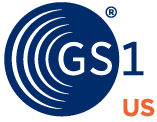RFID is a wireless technology that enables product identity to be detected using an interrogator that is in close proximity (within a few yards) to a product. The RFID tag is often part of product packaging (primarily embedded in the price tag) and expected to be disposed of by the consumer prior to use.
Product manufacturers and retailers use RFID to improve supply chain and store-level inventory accuracy. This enables brand owners and retailers to quickly, efficiently, and accurately count inventory. This results in fewer errors and greater inventory accuracy (ensuring that the right product is at the right place at the right time).
An EPC is a serialized product identification code. It contains the same information as the UPC, with the addition of a serial number for enhanced item authentication. An EPC symbol (example above) means the product contains an RFID tag that carries the EPC number.
The "EPC" (pictured above) indicates that an RFID tag is present on an item. The RFID tag could be embedded in adhesive labels or swing tickets, or even embedded in the product or packaging.
RFID tags do not contain any personally identifiable information about consumers. The only information that is contained in the RFID tag relates to the product, not the purchaser.
Want to learn more?
*EPC® is a registered trademark of EPCglobal, Inc.

